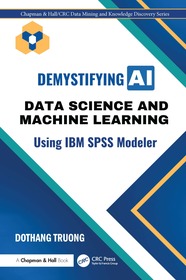
Demystifying AI
Data Science and Machine Learning Using IBM SPSS Modeler
Sorozatcím: Chapman & Hall/CRC Data Mining and Knowledge Discovery Series;
-
10% KEDVEZMÉNY?
- A kedvezmény csak az 'Értesítés a kedvenc témákról' hírlevelünk címzettjeinek rendeléseire érvényes.
- Kiadói listaár GBP 89.99
-
42 992 Ft (40 945 Ft + 5% áfa)
Az ár azért becsült, mert a rendelés pillanatában nem lehet pontosan tudni, hogy a beérkezéskor milyen lesz a forint árfolyama az adott termék eredeti devizájához képest. Ha a forint romlana, kissé többet, ha javulna, kissé kevesebbet kell majd fizetnie.
- Kedvezmény(ek) 10% (cc. 4 299 Ft off)
- Kedvezményes ár 38 693 Ft (36 851 Ft + 5% áfa)
Iratkozzon fel most és részesüljön kedvezőbb árainkból!
Feliratkozom
42 992 Ft

Beszerezhetőség
Még nem jelent meg, de rendelhető. A megjelenéstől számított néhány héten belül megérkezik.
Why don't you give exact delivery time?
A beszerzés időigényét az eddigi tapasztalatokra alapozva adjuk meg. Azért becsült, mert a terméket külföldről hozzuk be, így a kiadó kiszolgálásának pillanatnyi gyorsaságától is függ. A megadottnál gyorsabb és lassabb szállítás is elképzelhető, de mindent megteszünk, hogy Ön a lehető leghamarabb jusson hozzá a termékhez.
A termék adatai:
- Kiadás sorszáma 1
- Kiadó Chapman and Hall
- Megjelenés dátuma 2025. december 16.
- ISBN 9781032740003
- Kötéstípus Keménykötés
- Terjedelem616 oldal
- Méret 254x178 mm
- Súly 453 g
- Nyelv angol
- Illusztrációk 6 Illustrations, black & white; 647 Illustrations, color; 29 Halftones, color; 6 Line drawings, black & white; 618 Line drawings, color; 151 Tables, black & white; 15 Tables, color 700
Kategóriák
Rövid leírás:
This book is designed to cater to readers who prefer a hands-on guide using SPSS Modeler, a widely popular software that does not require coding or programming skills. It targets a broad audience, including students, lecturers, researchers, and industry professionals.
TöbbHosszú leírás:
As artificial intelligence advances at an exponential pace, understanding data science and machine learning has become increasingly essential. Yet, the wide range of available resources can be daunting, posing challenges for beginners. This second book builds on the foundation laid in the first, Data Science and Machine Learning for Non-Programmers: Using SAS Enterprise Miner, providing similar fundamental knowledge of data science and machine learning in an accessible way. It is specifically designed to cater to readers who prefer a hands-on guide using IBM SPSS Modeler, a widely popular software that does not require coding or programming skills. Like the first book, this volume helps learners from various non-technical fields gain practical insight into machine learning but shifts the focus to a different tool for those seeking alternatives to coding.
In this book, readers are guided through practical implementations using real datasets and IBM SPSS Modeler, a user-friendly data mining tool. The approach remains consistent with a focus on application, providing step-by-step instructions for all stages of the data mining process using two large datasets, ensuring continuity and reinforcing concepts in a cohesive project framework. This book also offers practical advice on presenting data mining results effectively, aiding readers in communicating insights clearly to stakeholders.
Together with the first book, this volume is a companion for beginners and experienced practitioners alike. It targets a broad audience, including students, lecturers, researchers, and industry professionals. It offers flexibility in learning pathways and deepens understanding of data science using easy-to-follow, software-based approaches.
TöbbTartalomjegyzék:
PART I Introduction to Data Mining
Chapter 1 Introduction to Data Mining and Data Science
Chapter 2 Data Mining Processes, Methods, and Software
Chapter 3 Data Sampling and Partitioning
Chapter 4 Data Visualization and Exploration
Chapter 5 Data Modification
PART II Data Mining Methods
Chapter 6 Model Evaluation
Chapter 7 Regression Methods
Chapter 8 Decision Trees
Chapter 9 Neural Networks
Chapter 10 Ensemble Modeling
Chapter 11 Presenting Results and Writing Data Mining Reports
Chapter 12 Principal Component Analysis
Chapter 13 Cluster Analysis
PART III Advanced Data Mining Methods
Chapter 14 Random Forest
Chapter 15 Gradient Boosting
Chapter 16 Bayesian Networks
Appendix A
Appendix B
Appendix C
Több



